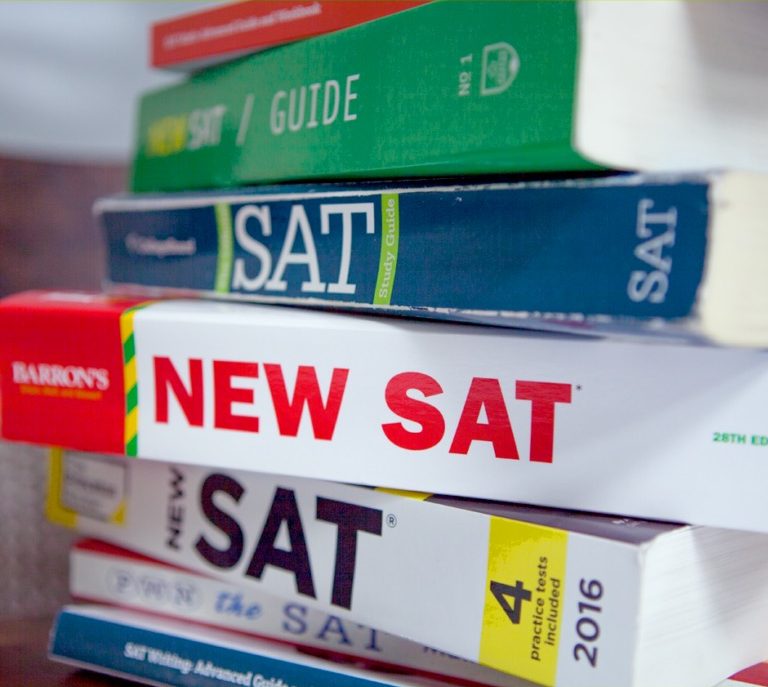“The SAT is coming back at some colleges. It’s stressing everyone out.” “College applicants face confusion and anxiety over changing SAT admission requirements.” “The SATs are: a) dying; b) already dead; c) alive and well; d) here forever – The confusing future of standardized testing, explained.”
These headlines are just some of the countless articles that have been published in recent months, alerting hopeful applicants to changes made by many colleges and universities regarding their testing requirements – but the emphasis on these changes could be causing further stress. As Associate Director of College Counseling Ms. Marsha Setzer explained, “I think changes in policies in general create some angst. This is a stress-inducing process, particularly at Bishop’s, and there’s a lot of anxiety around it. So anytime there are changes, it’s like, well, ‘How does this affect me?’”
Director of College Counseling Ms. Wendy Chang explained that, prior to the COVID-19 pandemic, most schools required some form of testing — whether it was the SAT or ACT. There have also always been a few that upheld test-optional policies, meaning that students could choose whether or not they wished to submit test scores. However, it was impossible to schedule anywhere to take tests during the pandemic, resulting in many colleges simply refusing test scores or instituting test-optional policies. Now, as COVID fades into the background, many colleges are reversing their test-optional policies.
While many of these policy shifts felt sudden for students, Ms. Setzer explained that students were, for the most part, given sufficient time to plan — although some schools announced changes for this fall as late as February.
According to Ms. Chang, “Probably the biggest rationale that some colleges are using to justify switching back [to testing] is equity and access. They’re saying that by requiring students to take the test, they’re able to identify students more easily who maybe would not have applied to their schools before and to do active outreach to those students.”
So to what extent will these changes impact students applying to colleges?
As of July, there were no available seats in any SAT testing center within a 100-mile radius of the Bishop’s zip code (92037) until November. Sydney Mafong (‘26) said, “I know many students (including myself) who are taking the SAT out of state. I have to take it in Arizona and am hoping spots will open up in California.”
Ms. Chang explained that many high schools in California may primarily have students who, if they do attend a four-year college, mainly apply to schools within the University of California (UC) and California State University (CSU) public school systems. UCs and CSUs are “test-free,” meaning that even if you took a test — ACT or SAT — and wanted to submit them, you wouldn’t be able to. Because of this, she says that California has been slow to adapt and provide more testing centers.
Sydney explained that because schools are reversing their test-optional policies, and are now requiring students to submit scores, it is imperative to have sites available. She added that many students might lack the resources necessary to take a test out-of-state.
Sydney said, “While this isn’t causing me extra stress, it is frustrating that so many California students have to test out of state.”
But for students who have already gotten a testing date or who have already tested, like many rising seniors, the changes don’t affect them as much.
Ehiosa Bello (‘25) said that she had “been planning to submit test scores regardless of the optional policy, so personally, I’m not that stressed.” David Lai (‘25) agreed with this sentiment, saying, “I always planned to submit my SAT score, so this change hasn’t really affected me that much.” Sofia Hayden (‘25) also agreed, saying, “Colleges going back to required testing does not change my own application process as I had already decided to take the ACT anyways.”
While the majority of students at Bishop’s were already planning on or have already taken the SAT and/or the ACT, students still have concerns.
David voiced one such concern, saying that he is “a little more stressed since I know that more and more people will put their SAT/ACT score in their college app and take SAT/ACT, meaning that the scores I will be competing against could be higher, meaning that when I take it in August, I have this added pressure to do even better to ensure that I maintain my competitiveness throughout the process.”
Suriya Bowen (‘25) added, “Part of me feels more stress with testing being needed because I’m not sure how much it’s considered at each college but part of me likes it because a lot of colleges say it’s only part of the consideration and can make the application stronger.”
Candace Dada (‘25) said that, while this doesn’t drastically change anything for her, “I feel that when colleges weren’t requiring testing you were evaluated based on character and how you interacted in your community. Now that tests are back you’re being evaluated on who you are academically and as a person, which does cause extra stress.”
While most Bishop’s students may find themselves only slightly more stressed, Ms. Setzer said, “One thing I tell my students all the time is that we are far from representative of the whole spectrum of college-going students.” For others, she explained, these changes may have bigger ramifications.
Gabby Gaspar (‘25) agreed with this idea, and said, “Not all students in the US have access or the money to afford the resources [such as tutors]. Just because someone comes from an underserved community shouldn’t mean it should be harder for them to get into their dream school.”
Students including David expressed concerns for peers who may not be as comfortable taking tests. He said that, for such students, newly re-instituted test-required policies “can affect many students since testing isn’t their strong suit and with a less-than-optimal score, which can hurt their chances of getting into a college [that they hope to attend].”
Throughout these changes, the Bishop’s college counseling department has worked to keep students and families well informed and to address any concerns. Ms. Chang said, “We tried to alert the rising seniors as quickly as we could when the new test dates for August SAT opened up. Everybody’s concern might be a little bit different.”
Ms. Setzer added, “In general, my advice, even when most schools were test-optional for students, was that it’s really low stakes, so take a test, and see how you do. If you don’t want to send it, you don’t have to, if you want to send it and it can add value to your application, you can, so that advice never really changed.”
Whether you choose to take the SAT or ACT or not at all, just remember: it’s just one element of a student’s application.









